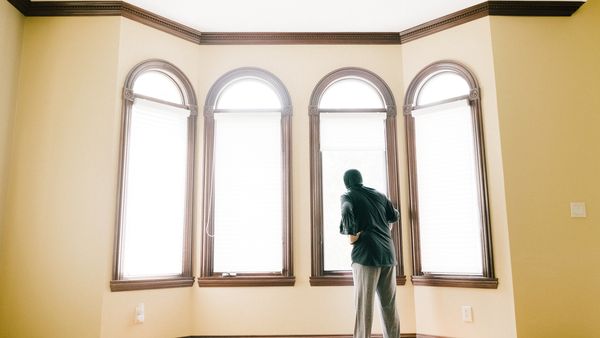 |
| Bibi Bahrami in the Muncie Islamic Centre Photo: Karl Schroder |
Have you ever wondered how short films make their way to the Oscars? There are literally thousands of them made every year and the process begins when they are submitted to festivals. if they are successful in being selected by one of those with Oscar-qualifying status, and if they then successfully compete with other such films, they have a chance of making it onto the shortlist. This makes two things possible. It can help new filmmakers break into the big time, and it can – especially in the Documentary Short category – help to draw public attention to subjects of real importance.
 |
| Richard 'Mac' McKinney Photo: Karl Schroder |
Making good headway in this process is Joshua Seftel’s short documentary Stranger At The Gate, which will shortly be available to watch worldwide courtesy of the New Yorker. It’s the extraordinary story of how a former US marine’s desperate plan to blow up a mosque took an abrupt turn, saving and changing many lives, not least his own. It’s really exciting to have made this much progress with the film, says Josh when we meet, sipping his kombucha – but it’s getting the film’s message out there in such a timely manner that’s what really matters.
“I actually was doing a bunch of short films about American Muslims,” he explains, referring to the series The Secret Life Of Muslims. “I've been doing it for about eight years. And my team came across the story in local newspaper article in the ‘States. And we were just like, ‘Oh my God, can this be real?’ And we reached out to Richard McKinney - Mac McKinney – the veteran in the story. And then we reached out to the congregants of the mosque. My gosh, these people are incredible. And we thought ‘We have to make a film.’
“ I grew up in a small town in upstate New York, about three hours north of New York City, and I faced a lot of anti-Semitism growing up there as one of the few Jewish kids in the area, and got picked on a lot. I was called names and people threw pennies at me to remind me that Jews are cheap, and things like that. So, you know, I kind of carry that with me. And when I saw Islamophobia in the US becoming such a big thing, I just thought, you know, I'm a filmmaker, I've done some things, I'm in a position to try to help with this; so that's what I set out to do.”
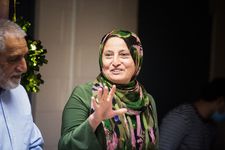 |
| Bibi Bahrami Photo: David Herbert |
The film has a lot to say about how quite small actions and individual actions can make a big difference.
“Oh, my gosh, the smallest. Like, just saying ‘Hello’ and smiling. That's what I think is so powerful about this story because, you know, you see films about problems in our society and you often walk away feeling hopeless, because you're like, ‘Well, there's nothing I can really do, right?’ But I think this story shows us that there is. There's something actionable here, there's a call to action: welcome the stranger. Be kind to people you don't know. Who knows what impact that may have? It certainly can't hurt.”
I tell him that, to me, the film also seems quite powerful in itself, just because it's an antidote to all the cynicism that we see in cinema, as much as anywhere else – and the assumption that the worst thing is going to happen, no matter what. Does he think that it’s important in itself to give people that belief that things can be better?
“I absolutely, completely agree with that sentiment,” he says. “I feel like, you know, you look at the news stories today and you see hate crimes and shootings and it's so easy to feel hopeless. In this country [the US], it's so divided right now. You hear people talk about like, ‘Are we going to have a civil war?’ And it's like, ‘What?’ But it feels...not out of the question. I think it's so important to be talking about our shared humanity. It's so important because that's the thing that I think can save us right now. If we saw more stories like the story of Richard McKinney and the congregants from the Muncie Islamic Centre, I think we might feel a little differently about our fellow fellow human beings that we share this Earth with. It's a message of hope.”
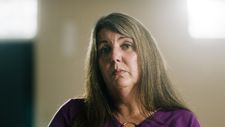 |
| Dana McKinney, Mac's wife Photo: Karl Schroder |
It has a relevance beyond people coming back from war as McKinney did, he says.
“It's about people down the street from you, you know, people who are maybe getting just one type of information. Maybe it's bad information, and they are getting the wrong idea about their neighbours, about the people in society, but they maybe don't know that they're getting the wrong idea. And to tell a story about what we have in common, and to dispel myths about groups that may be getting misunderstood, I think is is a step towards something good.”
The background story of the mosque is an interesting one as well, because it's been founded to help people from all over the world, who have escaped from various war zones, to find community and security where they are. Does he feel that there is a lack of community in parts of the US today, and that building community is something which can help us to reach people who are isolated like that and getting the wrong information?
“I feel like you're going to make me cry,” he says, pausing for a moment. “I do. I I feel like it's such a problem. But we just need to be connecting more and talking to each other and being part of our community and understanding others who are different from us. And it's essential. I think that mosque is a really interesting example of a place where there's a lot of diversity, and there's a lot of openness. You know, they even have people from other faiths who come and spend time there because they're so open in the community. And it's broader than just about connecting with people and welcoming. Mac McKinney, he needed somewhere to go, you know? He needed someone to take him in, understand him. And when they did that, in this group, people changed everything.”
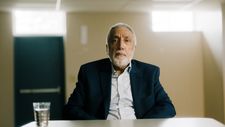 |
| Saber Bahrami Photo: Karl Schroder |
Partway through the film, we discover that the FBI have also been keeping an eye on McKinney. How did the people at the mosque react when they found out about that? There's a little of it in the film, but it must have been a huge shock for them.
“Yes,” he says. “We thought it was really important to talk to law enforcement about what happened, because this was a serious threat to people and we wanted to make sure that was understood. They were very open to talking about it. In terms of the way that the folks that the mosque thought about it, I actually spoke with Bibi Bahrami, the woman in the film, about it this morning, and I actually was asking her about this very thing. I said, How could you forgive Mac once you found out what he was intending to do? And she said ‘Look, I know people, and he was a broken person. He needed help.’ And she said ‘I forgave him from day one.’ I don't know how you get to the place of kindness and enlightenment that she's at. That's how she felt.
“I think all of these people are inspiring. Everyone in this film inspired inspired me. I think they're beautiful people. Even Mac, what he was able to do with the help of these amazing people, to transform, and that's not an easy thing to do.”
Part of what makes the film so powerful is that it contains unusually raw and honest testimony. I ask Joshua how he got that.
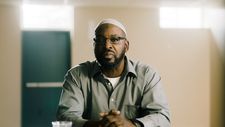 |
| Jomo Williams Photo: Karl Schroder |
“Good question,” he says, taking a moment to think.” I love talking to people. And I go into interviews with as little judgement as possible, and a lot of curiosity. And I just sort of prepared myself to say like, you know, there are certain things that in normal conversation, you might not ask someone a question, even though you're wondering, and I just sort of gird myself and I say, ‘Okay, I'm just going to ask that question that I'm wondering, and everyone else is wondering, I'm just going to do it. And I'm going to do it with openness and curiosity, and without judgement. Head to head can be awkward, but I think that at the end of the day, people want to be understood. People do want to share their stories. I just have to hope that they don't punch me in the face.” He laughs
Would he say that he has changed and grown as a result of making this series of films?
“Yeah, he says. “I've met so many amazing people, inspiring people. My comfort level with different kinds of people just constantly grows and deepens from doing these films and meeting people and getting to know them, and finding that common ground. There was a time, several years ago, when, as a Jewish filmmaker, I hadn't really spent much time in mosques. And now going into a mosque is very, very comfortable for me. I think it would help everyone to try to expose themselves to things that are unfamiliar, because I think that's how we grow. Trying to talk to people who are different from us.
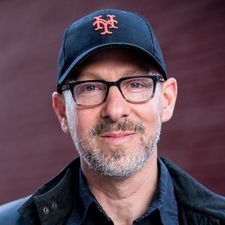 |
| Joshua Seftel |
“That’s the message of the film. It's something I need to remind myself every day, because some days I'm like, ‘Oh, wait, I'm in a bad mood,’ or I'm angry about something. I have to remind myself, like, who, what am I? What if I changed to kindness, right now? What would happen? I'll be on a plane, and I'll be sitting next to someone I don't know, and there's something about them – it could be that they're eating a messy sandwich or their elbow is in my space, or something, you know? And what I try to do now, instead of just getting irritated and holding on to that feeling, is I try to make a conversation with them. And usually, we end up becoming friends, even if it's for a short period of time, and I quickly forget about the sandwich or the elbow, or whatever it is that's bothering me. I've lately really tried to make that a practice. It just makes life better, and I think it's something really simple that anyone can do.
“We showed the film at the Islamic Centre of Muncie the other day. Someone in the audience stood up and said ‘Every American needs to see this film.’ I actually take it one step further in that I think everyone in the world should, because it is the message for this moment. It's actionable. It's something we can all do: just be kind. And it does make a difference, because that's how you become connected with people who are different and welcome the stranger. It’s powerful. It erases barriers, and it opens up possibilities to find commonalities and shared humanity. And we need that right now more than ever.”





















